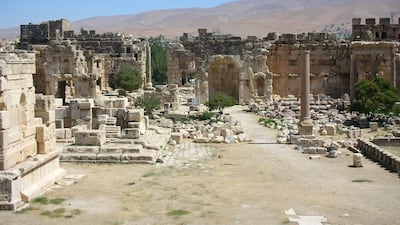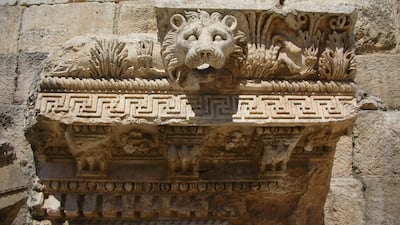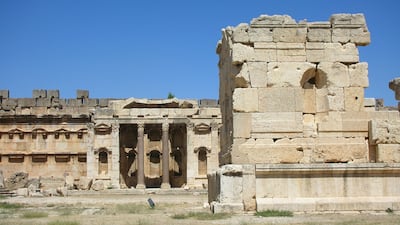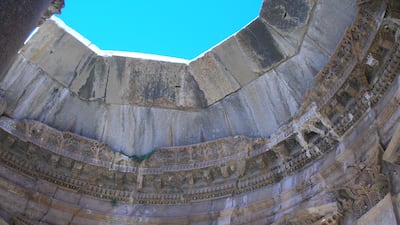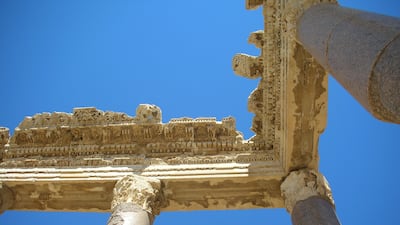Live updates: Follow the latest on Israel-Gaza
Seven people were killed in the latest Israeli air strikes on Lebanon's eastern Baalbek-Hermel region on Thursday, as intense attacks continued across the country.
The Israeli army issued eviction orders for all of historic Baalbek city for the second day in a row, hours ahead of the attacks. Eviction orders were also issued for the Rashidieh refugee camp, in the south of Tyre, causing panic in the second largest Palestinian camp in Lebanon.
Four people were killed in a strike on the Baalbek town of Boudai, with three others dead in an attack on nearby Sahmar, according to Lebanon's National News Agency. A “violent raid” was also reported on the town of Hermel, with no details immediately available.
The deaths bring the total number of people killed over the last week in Israeli air strikes on Baalbek-Hermel to 93.
On Wednesday, at least 26 people were killed across the governorate in three different strikes. Eleven people including three women were killed in a strike on Baalbek's Salibi farm, NNA reported, with three wounded people admitted to intensive care. Baalbek Mayor Mustafa Al Chal told The National that most residents had already fled to areas north of the city after Israel issued the bombing notice on Wednesday.
But the village of Bednayel, north of Baalbek, was not included on an eviction map posted to social media by Avichay Adraee, the Israeli army’s Arabic-speaking spokesman. Despite this, a strike on a residential building killed eight people in the village on Wednesday.
On Thursday, rescuers were combing the rubble of a destroyed building in Bednayel, with the wreckage strewn with packages of nappies, children's socks and pyjamas. Hope of finding survivors had already dwindled, with the team searching only for bodies. They found one corpse when The National visited the site in the afternoon.
“The bombing was like an earthquake,” one man told The National.
The man, who declined to give his name, said he was affiliated with Hezbollah, the powerful militia and political party that is the target of the Israeli strikes. Hezbollah holds sway in the area but the man said all the victims were civilians – including his brother, who was a home designer, and sister-in-law, the owner of a beauty salon.
The site of the Bednayel strike was visited by international journalists on Thursday as part of a rare Hezbollah tour of the area that was interrupted by an Israeli eviction order.
It followed the deaths of at least 67 people in air strikes across the Baalbek-Hermel region on Monday in the “most violent day” for the area since the war began.
Israeli air strikes have left many villages abandoned, others overcrowded with displaced families, and survivors including children suffering from third-degree burns and other severe wounds.
Six health workers killed
Elsewhere in Lebanon, six health workers were killed and four others wounded in three separate strikes across south Lebanon on Thursday. It brought the total number of health workers killed in over a year of Israeli strikes to 178, with another 279 wounded, the Lebanese health ministry said.
Hezbollah said it had launched several rocket and artillery attacks against Israeli forces near the southern town of Khiam. It was the fourth straight day of fighting in and around Khiam, a strategic town perched on top of a hill in south Lebanon. Khiam is notorious for previously having hosted a detention centre run by the defunct Israeli-backed militia the South Lebanon Army.
Iran-backed Hezbollah has vowed to continue attacks against Israel until the war in Gaza is ended. Delivering his first speech on Wednesday, new Hezbollah chief Naim Qassem, who replaced Hassan Nasrallah after he was killed in an Israeli air strike in September, said the group will press on with its “war plan”.
Pledging to follow his predecessor's agenda “in all aspects”, Mr Qassem hinted at further attacks against Israeli Prime Minister Benjamin Netanyahu, whose private residence was attacked by a drone earlier this month.
“The enemy must know that its bombing of our villages and cities will not make us retreat, and the resistance is strong and was able to deliver a drone to Netanyahu’s room,” he said. “Netanyahu survived this time, but perhaps his time has not yet come,” he added, saying the group “will not beg” for a ceasefire.
While Israel has regularly struck Lebanon since cross-border hostilities began on October 8 last year, it intensified attacks last month, launching a campaign of air strikes that have displaced more than a million people and sent hundreds of thousands fleeing into Syria. It launched a subsequent ground invasion on October 1.
The US has stepped up efforts to secure a ceasefire, and Lebanese Prime Minister Najib Mikati has expressed optimism that a deal could be reached in “the coming hours or days”.
Israeli public broadcaster Kan published a document it claimed was a leaked proposal written by Washington, which would see Hezbollah withdrawing to the north of the Litani River and Israel removing its troops from Lebanon. Israel wants a strengthened version of the UNSC Resolution 1701, which ended the last war in 2006 but was never fully implemented.
However, Nabih Berri, the Speaker of Lebanon's parliament and an ally of Hezbollah, has said that there must be no change to the wording of 1701.

